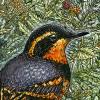

Join BirdNote tomorrow, November 30th!
Illustrator David Sibley and actor H. Jon Benjamin will face off in the bird illustration battle of the century during BirdNote's Year-end Celebration and Auction!
Circling silently above the earth on broad, black wings, vultures need little introduction. We know them as nature's clean-up crew, dining on dead and decaying animals. A unique range of adaptations allows vultures such as this Black Vulture to feast on food that’s off limits for many other organisms. Vultures also appear to have a remarkable immune system. For them, and for many other organisms, one key to understanding their place in nature is understanding their relationship with other elements in their environment.
BirdNote®
The Vulture's Iron Stomach
Written by Bob Sundstrom
This is BirdNote.
[Music]
Circling silently above the earth on broad, black wings, vultures need little introduction. We know them as nature's clean up crew, dining on dead and decaying animals. A unique range of adaptations means they can feast on what’s off limits for many other organisms.
By the time vultures make a meal of carrion, bacteria have already started the process of breaking down the carcass. This releases chemicals that are toxic for most creatures, but not the vulture. Like us, they have bacteria on their skin and faces and in their intestines. But theirs are heavy duty: flesh-eating Fusobacteria and highly toxic Clostridia, to name but two.
[Music]
Once the dead flesh is ingested, immensely powerful acids in the vultures’ gut begin digesting the flesh so thoroughly that they even destroy the prey’s DNA. But this dynamic digestive system destroys only some toxic microbes. It filters out others and concentrates them in the intestines. Vultures not only tolerate this deadly bacterial brew but appear to put it to work, extracting nutrients from food. In other words, they use bacteria from the food they eat to help them digest the … food they eat.
For BirdNote, I’m Michael Stein.
###
Bird sounds provided by The Macaulay Library of Natural Sounds at the Cornell Lab of Ornithology, Ithaca, New York.
Incidental music ‘Untouchable Suite 6’ by Trevor Duncan, from ‘Murder, Mystery, Suspense’ Cavendish Music, 1989
BirdNote’s theme music was composed and played by Nancy Rumbel and John Kessler.
Producer: John Kessler
Executive Producer: Dominic Black
© 2016 Tune In to Nature.org February 2018/2021 Narrator: Michael Stein
ID# vulture-01-2016-02-28vulture-01
Key source: http://www.livescience.com/48899-vultures-bacteria-microbiome.html







